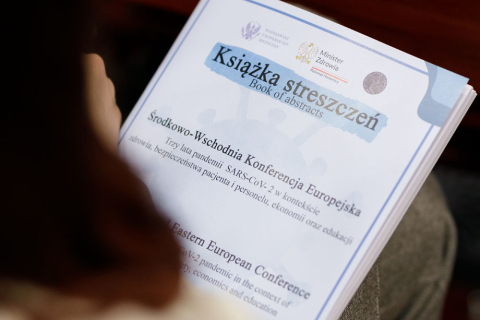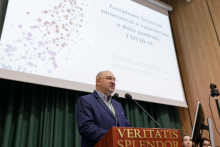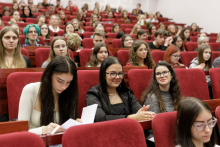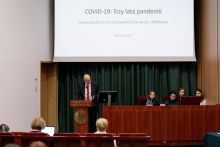The Central and Eastern European Conference "Three years of the SARS-CoV-2 pandemic in the context of health, patient and staff safety, economy and education" lasted two days. During this time, more than 30 presentations were presented in five sessions. There was also a poster session - 19 works took part in the competition. The workshop on a comprehensive approach to vaccination against COVID-19 was also exceedingly popular.
Professor Mariusz Gujski, Dean of the Faculty of Health Sciences, in his inaugural lecture recalled the most important facts related to the pandemic.
- A year passed between the isolation of the SARS-CoV-2 virus and development of the vaccine, and less than three years until the first medicines for the treatment of COVID-19 were created. I am not talking about medicines to alleviate the effects of infection, but about targeted medicines - stressed the Dean.
Proffessor Gujski also showed an interesting work - a study conducted among the crew of the American aircraft carrier Theodore Roosevelt. It was ca. 3300 persons. Scientists checked which methods of reducing virus transmission really work and to what extent. It turned out that wearing a mask reduces transmission by 70%, isolation by 40% and keeping distance by 50%.
In the inaugural lecture, an important question was also asked - What does COVID leave us with?
- We know that it leaves a set of symptoms such as: fatigue, muscle pain, headaches, i.e. the so-called “long COVID”. But we also have good news. We were worried, that infection leaves permanent marks in the lungs. Fortunately, these changes are reversing in almost all patients - said the Dean. What else is left after Covid? - excess deaths and health debt.
- By 30 November this year, 6,614,082 deaths due to COVID-19 were noted in the world (WHO data). Access to medical care was difficult. In Poland, such difficulties were reported by half of the patients, and the highest price was paid by oncological patients - concluded Professor Gujski.
During the conference, experts shared their experiences and conclusions. Everyone emphasized, that the pandemic was a huge challenge. There was a silent killer about whom little was known, and yet one had to work to make decisions and take responsibility for them. Now is the time to analyse and draw conclusions. This was the purpose of the discussion panel “Round table of experts in the area of health - Developing joint recommendations for actions at the systemic and local level in the era of infectious diseases.”
The event took place on 1 and 2 December. And it must be emphasized that the subject of the pandemic was covered in many aspects. Not only from the perspective of doctors, but also from the perspective of nurses, midwives, paramedics, public health and mental health experts. The conference was led by Edyta Krzych-Fałta PhD, head of the Department of Fundamentals of Nursing at the MUW.
The participants were: prof. Mariusz Gujski, Dean of the Faculty of Health Sciences MUW, prof. Robert Gałązkowski, Vice Dean of the Faculty of Health Sciences; dr hab. Łukasz Czyżewski, Vice Dean of the Faculty of Health Sciences; dr hab. Tomasz Kryczka, head of the Department of the Nursing Development, Social and Medical Sciences MUW; prof. Bolesław Samoliński, head of the Department of Prevention of Environmental Hazards, Allergology and Immunology of UCC MUW; dr Beata Guzak z Centrum Kształcenia Podyplomowego Pielęgniarek i Położnych, dr hab. Dorota Włodarczyk, Studium Psychologii Zdrowia WUM; dr Grażyna Wójcik the Department of the Nursing Development, Social and Medical Sciences WUM; dr hab. Barbara Piekarska Konsultant Krajowy w Dziedzinie Zdrowia Środowiskowego, the Department of Prevention of Environmental Hazards, Allergology and Immunology of UCC MUW; dr Zofia Sienkiewicz, the Department of the Nursing Development, Social and Medical Sciences MUW; dr Karolina Prasek, Department of Basic Nursing; dr hab. Dominik Olejniczak, Department of Pulic Health; dr Lucyna Kwiećkowska, Department of Basic Nursing MUW.
The discussion panel was attended by: prof. Irena Wrońska, Akademia Mazowiecka w Płocku, prof. Piotr Małkowski, Zakład Pielęgniarstwa Chirurgicznego, Transplantacyjnego i Leczenia Pozaustrojowego WUM, dr hab. Mariusz Wysokiński, Zakład Podstaw Pielęgniarstwa, Uniwersytet Medyczny w Lublinie, dr hab. Barbara Piekarska, konsultant Krajowy w Dziedzinie Zdrowia Środowiskowego; mgr Mariola Łodzińska, Naczelna Rada Pielęgniarek i Położnych, Stanisław Maćkowiak, Prezes Federacji Pacjentów Polskich, PhD Lukas Kober, Catholic University in Rużomberok.



